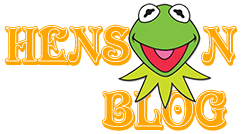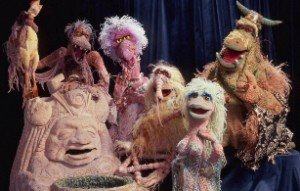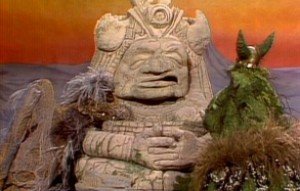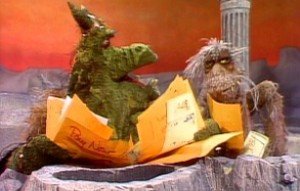SNL: “The Land of Gorch” #1-6
Although the major networks had still chosen to pass on The Muppet Show, Jim Henson and the Muppets did get a big TV break in 1975, when Lorne Michaels hired them to appear as regulars on his then-brand-new late-night sketch comedy show, then called Saturday Night, later to be known as Saturday Night Live. In fact, the Muppets appeared on the very first episode and weekly thereafter for the first months of the show (the first season of SNL is up on Hulu and Amazon, or you could watch it on DVD).
Rather than highlighting any of the known characters up to that point, however, these sketches–collectively known as The Land of Gorch–were an entirely new creation, with a cast of fantastical alien creatures living in a swampy, crater-filled world. Part of the reason NBC liked the idea of Jim Henson appearing on the show was because they hoped it would soften what they were worried would be an extremely controversial program. Jim, however, was eager for these characters to be as subversive and adult as the rest of the show was intended to be. As always, he was interested in demonstrating that puppetry could be an adult entertainment and felt this was a great opportunity.
And The Land of Gorch was, indeed, not at all a children’s puppet show. However, it also didn’t turn out as Jim had wanted, either. This was in large part due to the fact that, according to Writers Guild rules, neither he nor his people were allowed to pen the sketches, which had to instead be done by the main SNL writing staff. All he could basically do was make suggestions, so for the first time his puppeteers and him found themselves having to perform other people’s words–other people who came to resent having to write sketches for the Muppets at all, when the problem really was that their comedy styles didn’t mesh (additionally, the SNL actors themselves came to resent the Muppets for taking screentime away from them, making a fairly toxic situation even worse).
In his original notes for Gorch, Jim jotted down that he envisioned the characters to be archetypes based on Jung and commedia dell’arte, indicating that there was a certain level of high-mindedness and symbolism he wanted to attain with the piece. Not to say that he wanted it to come across as stuffy and pretentious–his concept for Sam and Friends came from a similarly artsy place but, in execution, was always free-spirited and fun–but he did put a great deal of careful thought into it, which the SNL writers didn’t seem to understand or appreciate. One might take that to mean that SNL‘s writers ended up being too subversive for him when, in actuality, it ended up being the opposite. He felt that their writing for Gorch was too sitcommy–“boring and bland,” as he put it. He wanted abstract zaniness and got plots that were fairly restrained, aside from drug references, which also weren’t exactly in his wheelhouse, either. Ironically, due to this and the sketches’ overall psychedelic feel, many people came to expect that he and the Muppets were stoners, when in actuality that came from the SNL writers.
Although they weren’t ultimately successful as an SNL sketch, The Land of Gorch remains fascinating today to a Muppet fan for multiple reasons. For starters, the puppets are absolutely magnificent, each with their own distinct, bizarre, alien look, yet all also clearly examples of the same bizarro species. This also, in some way, foreshadows the Fraggles, who also each had their own unique features while being broadly related, visually speaking. Secondly, the creation and worldbuilding of this alien/fantasy landscape may pale in comparison to later Henson works such as The Dark Crystal, Labyrinth, and, again, Fraggle Rock, but the roots of these later, much more beloved productions can certainly be seen here (it’s also a bit reminiscent of the Planet Koozebane, which appeared on The Muppets Valentine Show and would later recur on the main series).
Another link to Fraggle Rock is the Mighty Flavog, an allegedly wise, god-like being in the form of a statue (another brilliant puppet made of foam that looks like rock, similar to the Mount Rushmore puppet from Sex and Violence) who the main characters, King Ploobis and his faithful minion, Scred, visit in nearly each installment to ask for advice, which foreshadows Fraggle Rock‘s Marjory the Trash Heap, particularly in early Season 1, when the Fraggles would go to her in every episode to gain “wisdom,” which was often actually misguided or silly (later on, she would be used more sparingly and actually give good advice). Flavog also reminds a modern viewer of Yoda, thanks to Frank Oz’s voice and the character’s goofy sense of humor. It’s interesting to see how even a series of sketches over which Jim had very little creative control ended up even indirectly inspiring later work. There’s also just something cool, if somewhat strange, about hearing such familiar Muppet voices as Jim, Frank Oz, Jerry Nelson, and Richard Hunt coming out of such different characters and delivering such often risque, adult material.
In the hands of the SNL writing staff, the material is also quite sexist from today’s standpoint. The first sketch, which aired on the debut episode of the series, on October 11, 1975, is largely concerned with King Ploobis trying to make his shrewish wife, Peuta, happy while covering up his affair with a busty nymph servant, Vazh (pronounced “Vash”). The sketch is full of things that sound naughty though it’s never fully clear in exactly what way, as it’s filtered through the alien concepts of Gorch, so for example, Peuta is having trouble “releasing her darts,” which seems to be something to do with sex. Ditto the suggestion that he “massage her moogles” to help release them. Again, there is a definite novelty to hearing Muppets talking so sort-of dirty–especially given Ploobis sounds so much like Jim’s voice for King Goshposh–and, as always, Jim and the others are magnificent performers. The puppetry, as always, is masterly and the comedic delivery is spot-on. But it’s also weird to see an entire Muppet sketch basically about mocking a female character’s sexual bodily functions and asking us to empathize with the poor, put-upon male spouse. As Jim himself said, this is basically just a sitcom in outlandish trappings, and a pretty traditionally regressive one, at that.
With that said, there are definitely some funny gags here, and I particularly love Frank Oz’s deadpan delivery for Flavog’s voice, and how Ploobis and Scred have to present him sacrifices in order to gain his advice. After dropping two chickens in the fountain in front of him, a toilet flushing noise sounds as he devours them. And in the second outing (Oct 18th), it’s actually Scred who becomes the sacrifice! This time, Ploobis goes to ask Flavog about how he should cope with an economic crisis sweeping the Land of Gorch–a topical reference to the economic recession of the early-to-mid-’70s, with which the audience could clearly relate, going by their knowing laughter when Ploobis says that their “fair land is on the brink of default”. In the end, Flavog’s solution is to just keep feeding him Gorch citizens so that there’ll be fewer mouths to feed. This one also features an exchange that’s actually pretty classically Muppety, when Ploobis says they need “fiscal assitance,” and Scred responds, “Sounds painful!”
The third sketch (Oct 25th) turns its eyes from economics to drugs, when a furious Peuta nags Ploobis into doing something about their son, Wisss. Ploobis asks if he’s “locked himself in the bathroom with magazines again,” but, as it turns out, he’s picked up a nasty habit of “smoking craters”. Wisss’ smoking is a very impressive feat of live puppetry. We see his long, trunk-like nose inhaling the inside of a crater and then, a moment later, a cloud of smoke exhales from it. Richard Hunt plays Wisss as a cartoon-stereotypical stoner teenager of the era, saying things like, “Your aura’s really red,” “Flavog’s a cosmic turkey!,” and calling his dad, “man”.
Pages: 1 2



